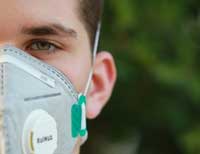
Midwestern company Ottawa Rubber is currently manufacturing 600,000 silicone rubber face shield straps and 18,000 clear plastic face shields needed by health care providers and other “critical” workers in Ohio, US. More than half of the rubber company’s manufacturing staff has been brought back to work on the new projects, from an initial layoff in March 2020, giving it some revenue – “It is largely because of this project that we were able to keep several people employed,” said Jennifer Ward, Director of customer service and sales.
Ottawa Rubber previously manufactured components for automotive OEMs, including General Motors and Nissan, and for the marine, heavy truck, printing and plumbing industries. However, the COVID-19 pandemic saw auto-related manufacturing having less and less activity.
President and Sales/Tooling engineer, Jeff Bretz, then reached out to the Ohio Manufacturing Advocacy and Growth Network (MAGNET) in response to the consortium’s solicitation of essential manufactured items needed for the pandemic.
Within three days, Ottawa Rubber received the go-ahead from MAGNET to start the process of manufacturing the silicone rubber face shield straps and clear plastic face shields: MAGNET delivered most of the materials used to make the face shields, while Ottawa Rubber sourced the silicone material and finessed machines typically used to make foam gaskets for heavy trucking OEMs. The first production run of 33,000 straps was shipped by April 9.
Bretz said the ramp-up for the new project was “much faster than anything [the staff] have experienced recently” as the company’s 15 professionals are used to completing jobs where parts are made from rubber materials ranging from silicone to EPDM. The company also is used to high-run projects, as it shipped out more than 10 million automotive parts in 2019 alone.
Ottawa Rubber’s management is now looking at options for making disposable face shields on its own, long after COVID-19eases; and, although Bretz doesn’t see the automotive market changing its manufacturing requirements after the pandemic, he realises that by showing a level of versatility Ottawa Rubber may be well-positioned to expand when the normal work cycle resumes.
“There’s value in being nimble – [customers] may see what we’re capable of and ask if we can help with other projects that they may not have asked about before,” Bretz said.
